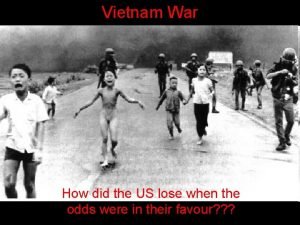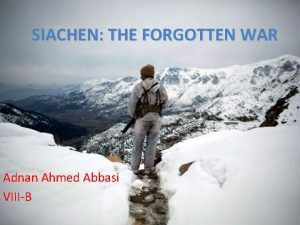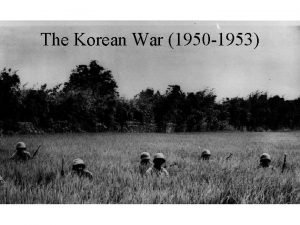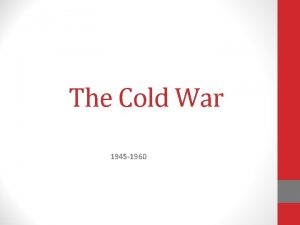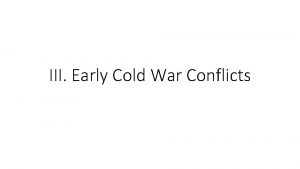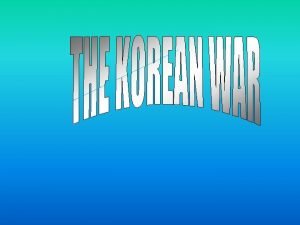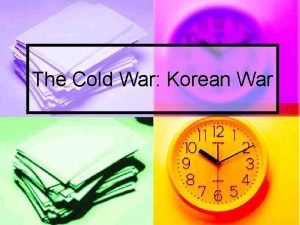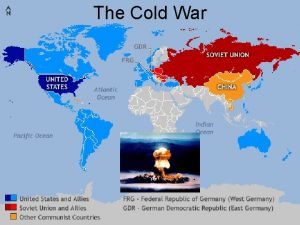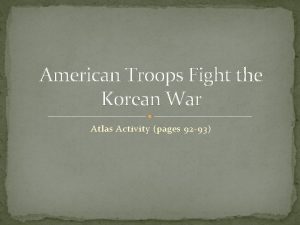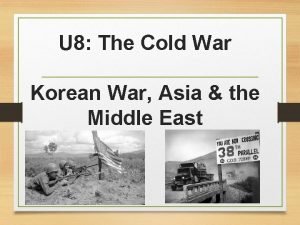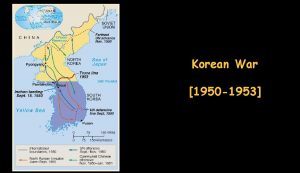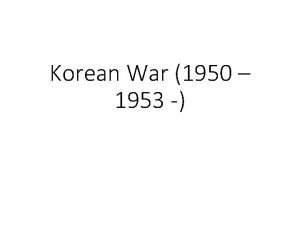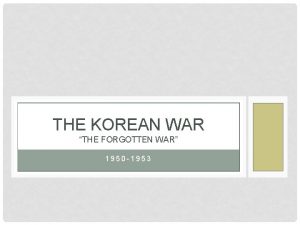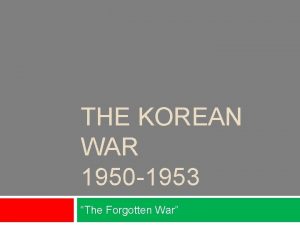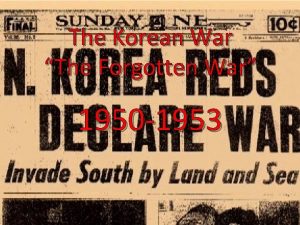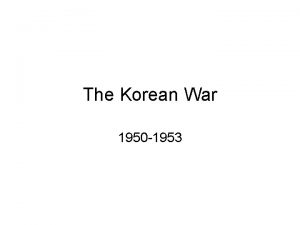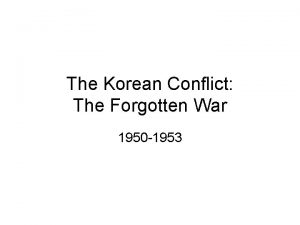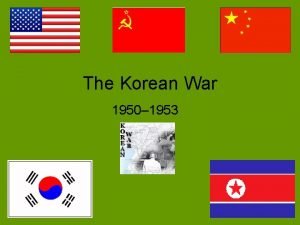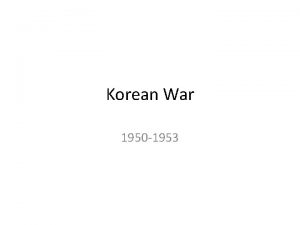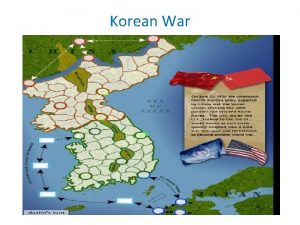Korean War The Forgotten War 1950 1953 1905














- Slides: 14

Korean War : The Forgotten War 1950 -1953

1905 -1945 � When the Russo-Japanese War ended in 1905, Korea became a protectorate and was annexed in 1910 by Japan. � The Allied victory in 1945 ended Japan’s 35 -year colonial rule of Korea. � In a proposal opposed by nearly all Koreans, the United States and the Soviet Union agreed to temporarily occupy the country as a trusteeship with the zone of control demarcated along the 38 th parallel. � The purpose of this trusteeship was to establish a Korean provisional government which would become "free and independent in due course. ”

Korea 1945 Though elections were scheduled, the two superpowers backed different leaders and two states were effectively established, each of which claimed sovereignty over the whole Korean peninsula.

A South Korean Government �The UN was unable to settle the matter to the satisfaction of the US and USSR. �In 1948 the South holds a general election and Syngman Rhee was elected to lead its government.

A Communist N. Korea In the Russian Korean Zone of Occupation, the USSR established a Communist North Korean government led by Kim Il-Sung. Both Syngman Rhee and Kim Il-Sung were intent upon reunifying Korea under their own political system. With Joseph Stalin and Mao Zedong fighting over the control of the Korean Peninsula, the North Koreans gained support from both the Soviet Union and the People's Republic of China. Eternal president of the Republic

June 25, 1950: War Begins � North Korean armies cross the 38 th parallel, dividing North Korea and South Korea was not expecting the attack and was caught completely off guard. � North Korean armies were easily able to invade South Korea, because the United States had not given South Korea enough weapons, for fear of having South Korea start a war against North Korea. � By June 27 th, Seoul, the capital of South Korea, was captured. South Koreans panicked as North Korea easily invaded their country.

A UN Police Action �The United States along with the United Nations decided to take a stand - if communism was allowed to spread in Korea, the UN feared it would only spread to close countries such as Japan. �With the Soviet Union boycotting the Security Council, the Truman was able to get the UN authorize the use of force to repel the invasion.

Mac. Arthur in charge General Douglas Mac. Arthur, UN Command observes the naval shelling of Inchon from the USS Mt. Mc. Kinley, September 15, 1950.

China intervenes: October-December 1950 On October 15, 1950, President Truman and General Mac. Arthur met at Wake Island in the mid-Pacific Ocean To President Truman, Mac. Arthur speculated there was little risk of Chinese intervention in Korea. On October 19 th thousands of Chinese troops crossed the Yalu River and entered the War.

Stalemate (July 1951 – July 1953)

Armistice (July 1953 – November 1954) � The armistice negotiations continued for two years. � President-elect, Dwight D. Eisenhower, went to Korea and used his influence to bring about the armistice.

The Aftermath/Significance �The Korean War (1950– 53) was the first major proxy war in the Cold War (1945– 91). The Korean War established proxy war as one way that the nuclear superpowers indirectly conducted their rivalry in thirdparty countries. �The Demilitarized Zone, (DMZ) a strip of land (250 x 4 km), is the most heavily militarized border in the world. Even so, skirmishes, incursions, and incidents between the combatants have continued since the Armistice was signed.

The Korean War Memorial

North and South Today Moon Jae-in – Elected Democrat Kim Jong-un – Dictator, Marxist/Communist
 Vietnam war
Vietnam war Comparing reconstruction plans venn diagram
Comparing reconstruction plans venn diagram War of the worlds 1953
War of the worlds 1953 Siachen the forgotten war
Siachen the forgotten war Korean war map
Korean war map Causes and effects of the korean war
Causes and effects of the korean war Korean war
Korean war Korean war cause
Korean war cause Rollback korean war
Rollback korean war Cause of korean war
Cause of korean war Korean war map worksheet
Korean war map worksheet American troops fight the korean war 48a answer key
American troops fight the korean war 48a answer key Korean war webquest
Korean war webquest Causes of korean war
Causes of korean war Finnish korean war
Finnish korean war
